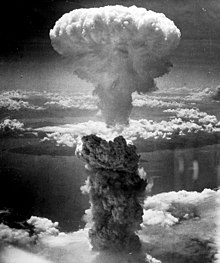Nuclear weapon

The mushroom cloud of the atomic bombing of the Japanese city of Nagasaki on August 9, 1945 rose some 11 miles (18 km) above the bomb's hypocenter.
A nuclear weapon is an explosive device that derives its destructive force fromnuclear reactions, either fission (fission bomb) or a combination of fission andfusion (thermonuclear weapon). Both reactions release vast quantities of energy from relatively small amounts of matter. The first fission ("atomic") bombtest released the same amount of energy as approximately 20,000 tons of TNT (see Trinity (nuclear test)). The firstthermonuclear ("hydrogen") bomb test released the same amount of energy as approximately 10,000,000 tons of TNT.[1]
A thermonuclear weapon weighing little more than 2,400 pounds (1,100 kg) can produce an explosive force comparable to the detonation of more than 1.2 million tons (1.1 million tonnes) of TNT.[2] A nuclear device no larger than traditional bombs can devastate an entire city by blast, fire, and radiation. Nuclear weapons are consideredweapons of mass destruction, and their use and control have been a major focus of international relations policy since their debut.
Nuclear weapons have been used twice in nuclear warfare, both times by theUnited States against Japan near the end of World War II. On 6 August 1945, the U.S. Army Air Forces detonated auranium gun-type fission bomb over the Japanese city of Hiroshima; three days later, on 9 August, the U.S. Army Air Forces detonated a plutoniumimplosion-type fission bomb codenamed "Fat Man" over the Japanese city of Nagasaki. The bombings resulted in the deaths of approximately 200,000 civilians andmilitary personnel from acute injuries sustained from the explosions.[3] The ethics of the bombings and their role inJapan's surrender remain the subject ofscholarly and popular debate.
Since the atomic bombings of Hiroshima and Nagasaki, nuclear weapons have been detonated on over two thousand occasions for the purposes of testing and demonstration. Only a few nations possess such weapons or are suspected of seeking them. The only countries known to have detonated nuclear weapons—and acknowledge possessing them—are (chronologically by date of first test) the United States, the Soviet Union(succeeded as a nuclear power byRussia), the United Kingdom, France, the People's Republic of China, India,Pakistan, and North Korea. Israel is also believed to possess nuclear weapons, though it does not acknowledge having them.[4][5][6] One state, South Africa, fabricated nuclear weapons in the past, but as its apartheid regime was coming to an end, it disassembled its arsenal, acceded to the Nuclear Non-Proliferation Treaty, and accepted full-scope international safeguards.[7] TheFederation of American Scientistsestimated there were more than 17,000 nuclear warheads worldwide as of 2012, with around 4,300 of them considered "operational" (ready for immediate use).culled from Wikipedia

No comments:
Post a Comment